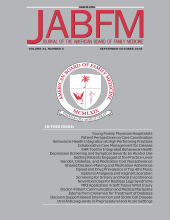To the Editor: Our thanks to Dr. Westfall for providing important comments on and context for this brief look at debt among family medicine residents. The brief1 was intended to highlight objectively a growing financial burden on those who do choose a career in family medicine and does not evaluate the degree to which that burden might affect or excuse the choices of others—though there exists a richer and more nuanced literature on that subject. Dr. Westfall's admiring interest in knowing more about those who select a discipline short in supply and remuneration relative to other specialties, and his suggestion that this is a contrarian choice worthy of our fascination, hints at a flawed approach to graduate medical education (GME) policy and planning in the United States.
As we've previously suggested,2 hospitals currently have every incentive to continue to make decisions about GME expansion based on their financial return rather than societal and population needs. This gives strong incentive to expanding lucrative subspecialty positions in areas with the most physicians, rather than giving needed attention to generalist positions in areas such as primary care, surgery, and psychiatry. Medical students in turn have clear incentives to follow suit, and debt is indeed but 1 of many factors influencing their decision making, and is very individual at that. The recent Institutes of Medicine report on GME calls for reforms to this market-driven—or, as Dr. Fitzhugh Mullan calls it, “anencephalic”—approach to GME planning.3 The Institutes of Medicine recommendation—to create a national coordinating body authorized to better direct GME resources to areas based on geographic and specialty needs and to set metrics by which to gauge sponsoring institutions' success in achieving these aims—would create a different set of choices for students and a different conversation about debt and student choice.







